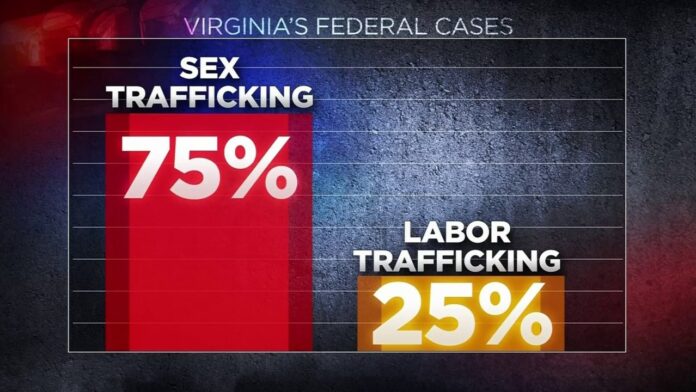The General Assembly has passed two identical bills intended to help social workers in the fight against minor-involved human trafficking. The bills, introduced by House Majority Leader Charniele L. Herring, D-Alexandria, and Sen. Mark Obenshain, R-Rockingham, were recommended by the Virginia State Crime Commission.
“I am thrilled that this bill passed,” Fay Chelmow, president of ImPACT Virginia, an organization that aims to prevent human trafficking, said in an email. “Family controlled human trafficking is so much more common than people think.”
The legislation allows local social services departments to interview the reported child victims or their siblings without the consent and presence of a parent or legal guardian, school personnel or an individual standing in place of a parent.
“This bill not only increases a minor’s chance to access safety but acknowledges their autonomy, resiliency and capacity for self-determination,” Chelmow said. “A minor’s assent is crucially important for their healing from the polyvictimization sustained at the hands of their traffickers and buyers.”
Human trafficking, considered modern-day slavery, involves the use of force, fraud or coercion to obtain some type of labor or commercial sex act, according to the U.S. Immigration and Customs Enforcement.
Sex trafficking is when a trafficker exhibits control over the victim and the victim receives something of value in exchange for performing sex acts. Traffickers recruit at locations such as middle and high schools, courthouses, foster care, group homes, bus stations, shelters, bars, restaurants, shopping malls and social media sites, according to the Virginia State Crime Commission. The agency concludes that child sex trafficking intersects with other problems such as drug addiction, runaway youth, child abuse, domestic violence and gang activity.
Human trafficking victims are forced into a wide range of labor sectors, ranging from sweat shops and field work to domestic service, according to ICE. By U.S. law, a person under the age of 18 engaged in prostitution is a victim of trafficking, the agency said.
As of June 30, 2019, there were 98 human trafficking cases reported to the National Human Trafficking Resource Center hotline that mentioned Virginia, according to the organization. In 2018, the hotline received 198 human trafficking reports that referenced Virginia, up from 158 cases that mentioned the commonwealth the previous year.
The commonwealth’s location along major highways and its international airports make it vulnerable to human trafficking activity, according to Virginia Attorney General Mark Herring. In 2017, Virginia ranked No. 4 in the top 10 of federal court districts where criminal sex trafficking cases were prosecuted involving children.
The legislation also changes the name from sex trafficking assessments to human trafficking assessments. This evaluation helps identify potential and existing victims of human trafficking. According to Kristen J. Howard, executive director for the Virginia State Crime Commission, human trafficking is a more accurate word because this assessment also can include evaluation of labor trafficking victims.
Howard said Herring and Obenshain’s bills change the classication from sex trafficking to human trafficking, to “more accurately describe the assessments since they also involve labor trafficking victims and not just victims of sex trafficking.”
An assessment is conducted to determine the immediate safety needs of the child, the extent of needed protective and rehabilitative services, and risk of future harm to the child.
Howard said she is “very happy” to see the legislation pass both chambers. In 2018, the commission conducted a large, comprehensive study defining sex trafficking, detailing how victims wind up in the sex industry, and making overall recommendations on how Virginia should change legislation to combat human trafficking.
This study led to a 2019 legislative package of eight bills. Legislators passed a total of seven bills — two in the Senate and five in the House — to help tackle sex trafficking. The bills included the establishment of the Virginia Prevention of Sex Trafficking fund, allowed for the use of two-way closed-circuit television in testimony by child victims and witnesses in sex trafficking cases, established class 6 felony charges for sex trafficking offenses involving a minor, and created a sex trafficking response coordinator within the Department of Criminal Justice Services.
Rodney Robinson / Capital News Service

